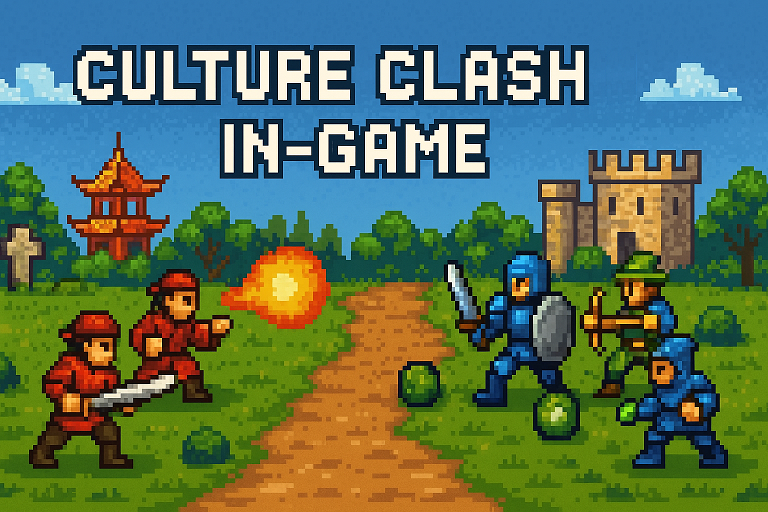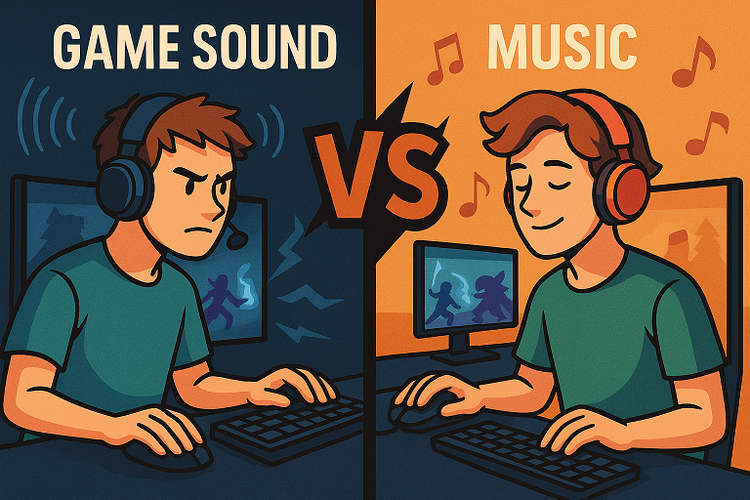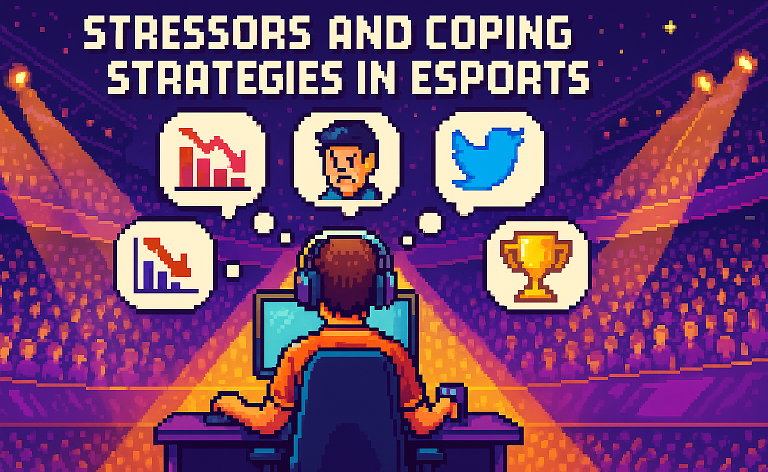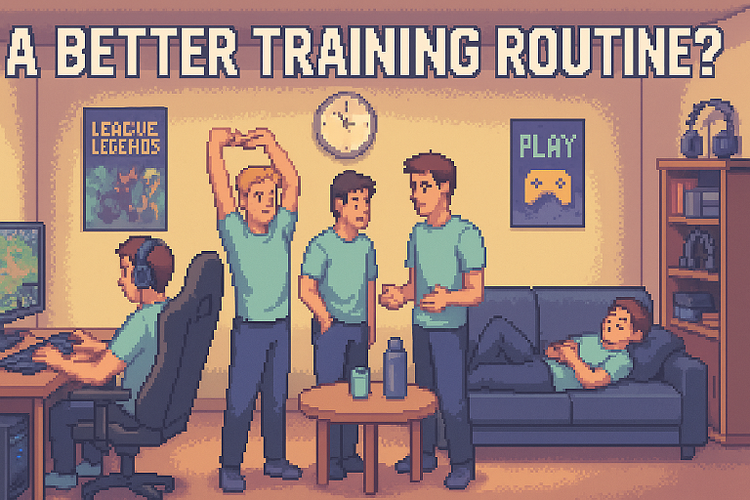Playing as a Job – Career Development of Professional Esports Players (2)
We discuss professional video game (esports) players' job career, which factors contribute to it, and challenges they face.
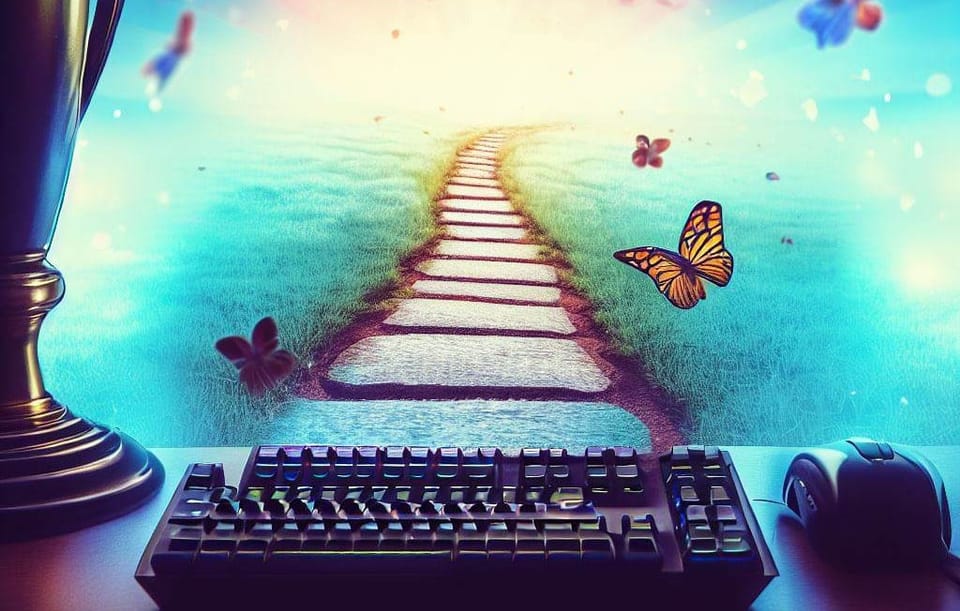
Hey friends,
last week, we discovered how professional Esports players’ careers develop over time – if you missed it, check it out here. Today, we dive deeper, exploring factors that influence the course of a player’s career, challenges they face on their path from a casual to a progamer, and what chaos theory (the Butterfly Effect) has to do with it.
last week, we discovered how professional Esports players’ careers develop over time – if you missed it, check it out here. Today, we dive deeper, exploring factors that influence the course of a player’s career, challenges they face on their path from a casual to a progamer, and what chaos theory (the Butterfly Effect) has to do with it.
🦋 Chaos Theory (in Careers)
To understand the complexity, dynamics, and factors in the career development of Esports players, Meng-Lewis and her colleagues in a study from 2022 interviewed 35 professional players from 16 professional teams in China. What they found was that Esports careers are much different from traditional ones; they are much more complex and dynamic. As a result, they proposed a new theory – the Chaos Theory in Careers (or CTC).
As the name suggests, it was influenced by chaos theory. Some of you have already heard of the infamous Butterfly Effect or chaos theory itself. The gist of it is that small changes in initial conditions (at the beginning) can have huge effects (different outcomes) later. At the same time, there are attractors – central, fixed points – that “attract” the orbit that forms the butterfly-looking shape.
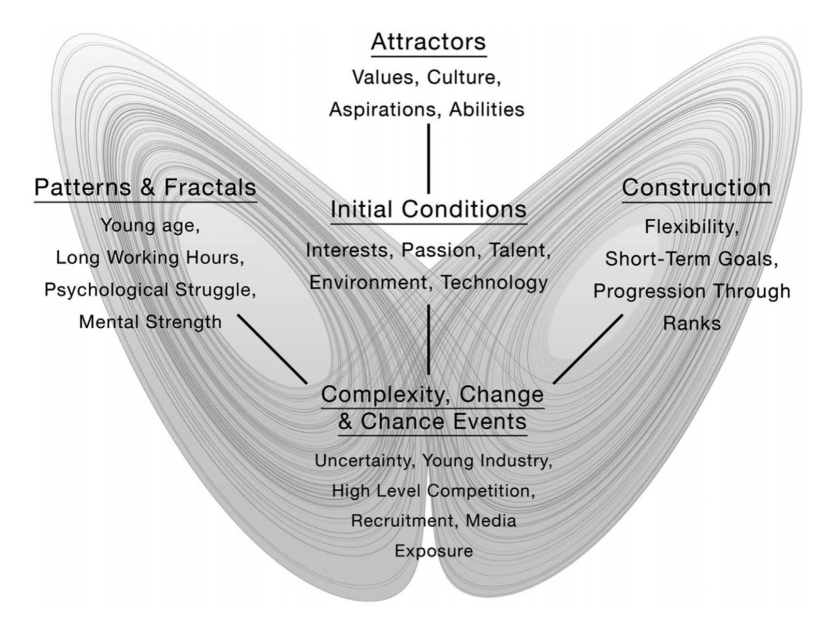
The framework consists of five characteristics: initial conditions, attractors, complexity, change and chance events, as well as patterns and fractals, and construction. Actors such as players, coaches, managers, family, friends, media, sponsors, and the government are connected and therefore influence each other.
🏁 Initial Conditions
In last week’s Sunday Summa, we saw:
“[…] that most players started their journey into Esports in their teenage years as a form of leisure entertainment, hobby and/or interest.”
Their career path is not something that was planned by their parents or even themselves in early years – it was likely incidentally initiated. 10-15 years ago, being a progamer wasn’t really an option for young adults, and the industry was much less known – especially in the west. Hence, the first move was triggered by personal interest and passion for playing games which, before, was initiated and fostered by friends, or family. One professional player said:
“When the game came out, because I didn’t really know anybody playing professionally, I was playing with my cousins, and friends from school. That was pretty much the norm.”
An individual’s natural talent and abilities (skills) – as an internal condition – appear to be a big factor in forming initial conditions. As an Esports player, you can’t be successful if your hand-eye coordination is bad; the same goes for your vision (e.g. detecting changes, such as an enemy coming around the corner in Counter-Strike), as well as capturing and processing information.
External conditions are outside of the player’s control. Referring back to the article “The Most Successful Esports Countries in the World”, we learned that the country you live in has an impact on how successful you are as a player. Countries with a high GDP “produce” higher-earning players due to the availability of infrastructure (high-speed internet), and residents who can afford PCs and games.
“Every family has computers now, and children all play computer games from a young age. It’s unlike the old times when we had to go to Internet cafés.”
Other external conditions are the political or social context, or the amount of money in the industry. If a career isn’t financially attractive, no one would go for it. On the other hand, having a tiny fraction of players making millions per year sparks the interest of younger players. There probably isn’t a single young person who plays video games who hasn’t dreamed of being a professional player, standing in the spotlight, traveling the world, and making good money, at least once.
The professional players interviewed in the study also stated that the influence of their parents’ support (or opposition) as well as the outside support structure (e.g. teams) had a great impact on the outcome of them going and becoming progamers. Another factor is the downsides that can occur when young people play video games.
“[…] academia, media, and the general public are becoming more cautious about the development of the Esports industry.”
This is due to concerns about health-related issues such as obesity, low amounts of physical activity (due to prolonged sitting), or video game addiction. Some of you may also know that games such as Counter-Strike were circling around in the media after each and every school shooting, stating they may have partly caused such tragedies. The negative press and downsides may hinder parents and players from supporting or pursuing a professional gaming career.
Culture and cultural beliefs held by players or their family may also contribute to the decision of pursuing the path of a progamer. Traditional beliefs, such as playing video games not being a job, and kids should focus on school, are still prominent in many parents today.
🕳️ Attractors
In the Chaos Theory in Careers framework, attractors are values, culture, aspirations, and abilities. Self-motivation and self-discipline are central to achieving success in Esports. Additional aspects are strong adaptability and being a quick learner. Since Esports careers are usually quite short, learning quickly to climb and adapting to new conditions (game updates, tactics, team members, etc.) is crucial. The same goes for motivation, or one’s drive to compete and become successful. Another internal factor is resilience.
“Although there is no lack of talent, as a manager, we prefer to stick to reliable players who can handle the stress and pressure of world championship tournaments. Their patience and psyche will be strained throughout the training and journey towards the championship. The competitiveness and often ruthless nature of E-sports tournaments is very much a psychological challenge that players must have the mental strength to overcome.”
🦢 Complexity, Change, and Chance Events
Chance always plays a role in life. From who your parents are (genetics), where you were born and live (environment – first-world country, countryside), to where you go to school, the people you meet, or just being in the right place at the right time. Similarly, chance contributes to a player’s career in Esports. It matters when your parents expose you to technology and games, when you start playing a certain genre of games, when you develop the drive to play competitively, who you meet and the connections you make, or black swan events such as the pandemic.
“During the outbreak, we wasted a lot of time and energy on distractions brought about by the appeal of live streaming, which were unnecessary. For example, some talented players were supposed to continue playing in competitions, but they chose to be streamers. Then, they disappeared completely from the circuit. When asked, they said regrettably that the streaming business had not been successful. This is because some players are technically skilled and not eloquent or savvy enough to be a successful streamer.”
🎢 Patterns and Fractals
Though the development process of Esports careers has chaotic elements, there are still patterns (e.g. the career frameworks from last week’s newsletter). One of the patterns, or stable elements, is age and the length of a career. As said before, careers of progamers are short, similar to traditional sports such as football (it’s football, not soccer!).
Depending on the game and its age restrictions, players may start playing professionally when they are below the age of 16.
“In spite of the fact that Esports is dominated by professional players in their early twenties, the younger players are always the best players. It’s very competitive and just by being a few years older, you lose the edge, and it slows you down.”
Two other emergent patterns concern their long working hours, and the struggle to stay at the top of their leagues. Playing just for a couple of hours usually, especially at the start of a career, isn’t enough. Some players play up to 16 hours per day.
Similar to traditional sports, only a tiny portion manages to be successful over a long period of time before they end their careers and transition to something else. Ups and downs – emotionally and in the rankings – are normal. Only the ones with
“[…] high-level mental strength, resilience, passion, and the hunger to win […] [define] qualities of successful Esports athletes.”
🚧 Construction
Since every Esports player’s career path is unique and driven by chance events, remaining flexible and adaptable to chances is important. This also includes creating short-term goals to construct their career, or focusing on new patches released by game developers. Making systematic progress (improve your ranking – in-game or in tournaments) while staying flexible and having flexible goals is what is needed to become a star player.
💡 Esports and careers in the industry are becoming more and more attainable for young players. However, the starting point, path, and progression are different for each individual. In a new environment such as Esports, careers are dynamic in nature. As a result, players have to be flexible, and focus on short-term goals. Black Swan and other chance events at all stages of a player’s career path impact the outcome.
What Esports lacks is a support structure that guides talented players through parts of their early careers. In Football, big clubs recruit talented young kids and give them the opportunity to train. In Esports, such a system is not there (yet). Bigger organizations may have an academy team to shape talented players, but the level and range are underdeveloped in Esports.
Hope everyone has an amazing week. Cheers,
Christian 🙃
Join over 250+ (🤯) Gaming Science subscribers and become smarter every week.
"I love this type of content, thank you Chris."

